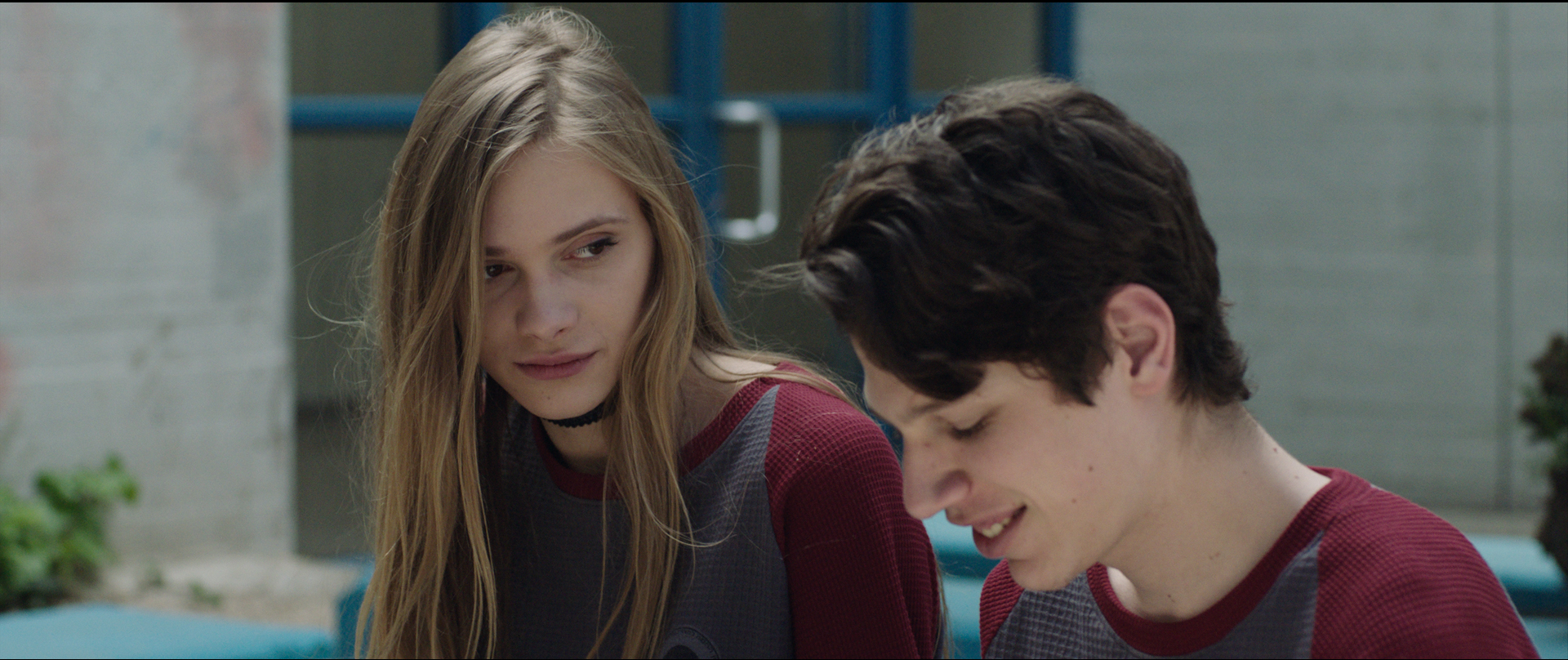
Janis Ian got it right – “I learned the truth at seventeen that love was meant for beauty queens…” – yet while the definition of beauty can be fairly rigid in high school, somewhere along the way most of us understand the limitations of that definition, and become aware of the underlying social-political forces at work to create and perpetuate those definitions. Although having the right look, clothes, shoes, and friends may not guarantee happiness in that most miserable of times, high school, they certainly can help. And when you don’t possess the culturally approved attributes, it can really hurt. Flawless (HaNeshef), written and directed by Tal Granit and Sharon Maymon, focuses on three teenage girls – Eden (Stav Strashko), Tigist (Netsanet Mekonnen) and Keshet (Noam Lugasy), as they anticipate the prom, hoping for a date, with excellent performances from all three.
The film’s Hebrew title is HaNeshef, which means “the ball,” referring to the senior prom, modeled after its American counterpart, yet also evoking the enchanted balls of fairy tales, where dreams come true. Few are the strong of spirit who can escape resist being drawn into that vortex of desire, delusion, and despair, known as “the prom.” It’s the pinnacle of high school daydreams, the emblem of consumer culture, a rite of passage laden with the symbolism of hetero-normative values and traditional gender roles. Now, don’t all attack me at once, much has changed over the years, but in many schools, people still may feel uncomfortable attending without a date; it’s an event that emphasizes the push for acceptance, if not popularity, and the need to show off in order to fit in. Also, it’s a lot of fun. No wonder it’s been the focal point of so many films, from Carrie (1976, my favorite), to Pretty in Pink (1986), Mean Girls (2004), and beyond. Adolescence is a time of extremes and Flawless emphasizes the almost surreal sense of longing and frustration inspired by the prom, as the popular girls receive dramatic, public, invitations from the hot guys, while the others watch and yearn, feeling inadequate. Granit and Maymon have a knack for capturing feelings and relationships, there’s a very authentic tone to the dialogue, as well as keen sensitivity to the social hierarchies and pressures.

Stav Strashko is Eden, a new girl who doesn’t really fit in with the popular crowd, and makes friends with others on the social sidelines, Tigist and Keshet, as well as a complicated relationship with Itay (Arad Triffon Reshef). The delicate balance of intimacy and secrets, mutual support that is threatened by the need for self-preservation; all these play out in a riveting and poignant manner, despite a plot that feels at times improbably dramatic. Spoiler alert – the following are plot elements that can be seen anywhere online, but still, a warning. Tigist and Keshet are convinced that all that stands between them and a date for the prom is a bit of cosmetic surgery, to be paid for by selling a kidney. It is extreme, it’s a crazy scheme; the kind of thing that might make sense to a teenager.
What does resonate profoundly is the human tendency to fixate on certain aspects of one’s appearance as problematic obstacles to happiness: “if only I had a different nose, longer legs, bigger boobs.” That kind of thinking is not just limited to teenagers, but teens are more limited in their options, they don’t get to decide very much about their lives; developmentally, there’s a lot of weird stuff going on in their brains, and their horizon is limited, they haven’t lived long enough to fully understand things like consequences.
Eden is not just the new girl in town, as a transgender woman she has experienced discrimination and ostracism in the past, and does not share her secret with Tigist and Keshet, even as their friendship develops. The interactions between the girls are full of fun and vitality, and provide some of the film’s best scenes. For all the drama and angst, it’s a fast-paced and engaging, fun film. My favorite scene in the film is when the girls are bemoaning their lack of rack, one of them asks “Where were we when they were handing out tits?” and Eden responds, “In the line for brains.” It’s the teen outcast conundrum in a nutshell: Eden knows she’s smart, and fun to be with, but she also knows that socially that’s not going to help her because she doesn’t fit the mold, she’s different. As anyone who has been to high school knows, it’s not necessarily about actually being different, it’s about being labeled as different.
Stav Strashko is radiant, she embodies the vulnerability and volatility of youth in her portrayal of Eden, at once confident and insecure, intelligent yet impulsive. She creates the character of a transgender teen with insight and compassion, reflecting the intelligence, courage and conviction required to come out to her family and insist on living her truth, as well as the anguish of feeling alienated from one’s body, and the loneliness of harboring a secret so essential to her being. In casting Strashko, a transgender woman, in a mainstream film intended for general audiences, Granit and Maymon are bringing something valuable to the ongoing conversation on casting. Micha Celektar gives a compelling performance as Eden’s father, a single parent who tries to empathize with and support his daughter, but is still struggling to accept Eden’s gender identity. Assi Levy is fairy-tale perfect as the villain who lures the girls under the guise of compassion. Netsanet Mekonnen and Noam Lugasy are much more than sidekicks, Mekonnen has a spark that makes one wonder what her character’s story might be. Ivri Lider composed a beautiful song for the film: “Now it only hurts when I breathe/when I dream…”
Although much of the action and conversation in the film is about breast augmentation, I would like to quote The Boob Fairy, a song by Deirdre Flint: “This isn’t a song about boobs. Not really./The boobs are just a set of metaphors to symbolize everyone’s fear of human inadequacy.” This isn’t a film about boobs, not really. It is a coming of age film about identity, friendship, bullying, popularity, the need for acceptance, and the misguided search for perfection.
Flawless (HaNeshef)
Written and directed by Tal Granit and Sharon Maymon; DIP: Giora Bejach; Editing: Einat Glaser-Zarhim; Costume Design: Laura Sheim; Music: Ivri Lider; Cast: Stav Strashko, Netsanet Mekonnen, Noam Lugasy, Micha Celektar, Assi Levy, Arad Triffon Reshef.





